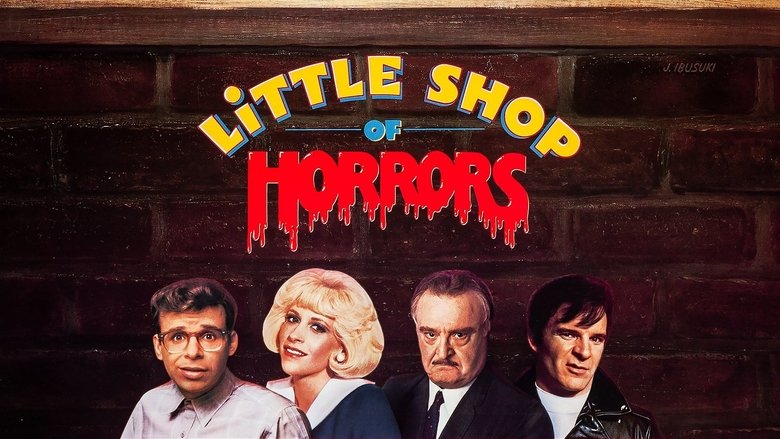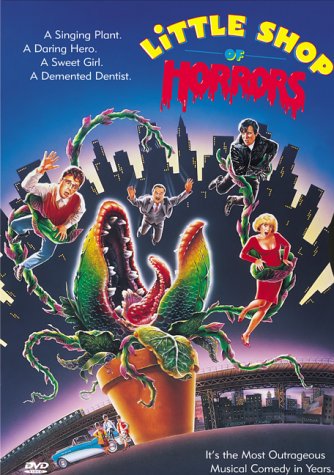← Back to Reviews

in
TwIsTeD ReViEw #6:
Little Shop of Horrors (1986)

Review composed by Sawman3.
Little Shop of Horrors (1986)

Review composed by Sawman3.
Musicals. By and large, I hate them. The Sound of Music? Save me. A West Side Story? Why, why, why, dear lord? It follows, then, that I was more than a little skeptical of this massive cult horror/comedy/social commentary classic from 1986, based on an even older play and film. Within about 10 minutes, that skepticism had disappeared. Little Shop of Horrors is one of the most enjoyable musicals (or films, for that matter), in recent memory.
Little Shop of Horrors was directed by Frank Oz, the man behind such other movies as Death at a Funeral (2007) and The Indian in the Cupboard (1995). We follow Seymour (Rick Moranis) and Audrey (Ellen Greene), two employees at a struggling florist's shop on Skid Row. Seymour, almost painfully earnest (and reminiscent, just a bit, of Woody Allen), is easily worried, girlfriend-less, and meek. Audrey is meek as well, but she has a boyfriend (a dentist), who both enjoys being the dominant male with the beautiful girl and enjoys inflicting pain on others. This leads to Audrey often showing up at work battered and bruised, to the chagrin and concern of Seymour, who thinks he may be in love with her but doesn't know how to show it, and their boss, who struggles to hide some genuine humanity beneath a gruff, money-loving exterior. Seymour, we quickly learn, has been more or less keeping the little shop alive by purchasing unique and rare plants from an Asian dealer down the street, who runs a small outdoor stall and is forever ruddy-cheeked and cheery. One day, after witnessing Audrey arrive at work late and beaten again, and after not seeing a single customer, Seymour makes a visit to the Asian man, hoping for a stroke of luck. He finds nothing that suits him, however, and turns to leave. At that same moment, a solar eclipse occurs, and in the ensuing darkness a mighty bolt of light crashes down into the plant dealer's stall. When light returns, Seymour spies a bizarre plant in a tiny pot where nothing interesting had stood just moments before. Confused, and sure that it must have been nothing but a simple oversight, Seymour purchases the plant and head on back to the shop.

Frank Oz.
Now Little Shop of Horrors can really build up some steam. The plant instantly brings customers into the shop, but Seymour quickly runs into a problem: the plant is dying, despite exhaustive research and his best efforts to give it sunlight, rich soil, and water. Then one night, while once again pouring over his agricultural texts, Seymour pricks his finger. When he comes close to the plant, which he has dubbed Audrey-II, it suddenly moves, lunging outward and snapping at his finger. We learn that Audrey-II requires blood to be able to survive... and not only to survive, but to grow. With just a few drops of Seymour's blood, Audrey-II grows to more than twice its original size. The customers are flocking in, but trouble awaits... only Seymour knows of the plant's appetite for blood, and Audrey (the human) is still being abused by her boyfriend.
I won't give away any more of the plot, because its twists and turns, and even its predictable events, are far too pleasurable to be revealed here. You have to watch the film and see them for yourself. I can, however, proceed with a critique.
The thing that Oz does best with Little Shop of Horrors is maintain a careful balance between dark comedy and genuine horror and social commentary. At any number of points the movie could have tumbled into one of the many pitfalls that await films like it: The Pit of Taking Oneself Too Seriously, The Pit of Not Taking Oneself Seriously Enough, and The Pit of Sudden and Uncalled For Departure from a Heretofore Reasonable and Well Contained Storyline, to name a few. As it is, however, Little Shop of Horrors plays the viewer like an instrument: I laughed just when a laugh was needed, I noticed real-world connections and dark predictions precisely when appropriate, and I reveled in the creepiness and action whenever Oz decided such revelry should be so. This leads me to another point about Little Shop of Horrors... it leaves you feeling, if just a little, manipulated. You feel that you, like the film's ill-fated characters, have been drawn into the alien plant's web of deception and control, and the ending, an ending which normally I would have seen coming but under Oz's masterful direction did not, only strengthened this feeling. A synonym for it would, perhaps, be "dirty", or "sullied". Yet, strangely, this feeling did not detract from my overall enjoyment of the piece.

Ain't 'e purty?
Another aspect that cannot be ignored is the subtle and not-so-subtle social commentary on display in Little Shop of Horrors. The actions of Audrey-II and the sadist dentist, but also of the media and businessman on display later in the film, are clear, embittered jabs at, in no particular order, American consumerism, capitalism, sensationalist media, and society's constant need for new, better, and more shocking entertainment. As is to be expected the placement and timing of such commentary is impeccable (as mentioned above), which resulted in my never being pulled from Oz's grasp. The "horror" in Little Shop of Horrors is inspired as much by this commentary as by the actions of Audrey-II itself.

Alien flesh-eating plants don't take orders from anybody!
All and all, Little Shop of Horrors is a neatly packaged, beautifully wrapped and presented cult musical masterpiece from Frank Oz. Cliche as it may be, I cannot avoid saying that this film has it all. Gore, action, humor, depth, and, yes, a cameo by Bill Murray. If you haven't seen it yet, I wholeheartedly suggest that you do. If you have, I suggest with equal fervor that you take this gem for another spin.
Rating:





or 9.8/10
Little Shop of Horrors was directed by Frank Oz, the man behind such other movies as Death at a Funeral (2007) and The Indian in the Cupboard (1995). We follow Seymour (Rick Moranis) and Audrey (Ellen Greene), two employees at a struggling florist's shop on Skid Row. Seymour, almost painfully earnest (and reminiscent, just a bit, of Woody Allen), is easily worried, girlfriend-less, and meek. Audrey is meek as well, but she has a boyfriend (a dentist), who both enjoys being the dominant male with the beautiful girl and enjoys inflicting pain on others. This leads to Audrey often showing up at work battered and bruised, to the chagrin and concern of Seymour, who thinks he may be in love with her but doesn't know how to show it, and their boss, who struggles to hide some genuine humanity beneath a gruff, money-loving exterior. Seymour, we quickly learn, has been more or less keeping the little shop alive by purchasing unique and rare plants from an Asian dealer down the street, who runs a small outdoor stall and is forever ruddy-cheeked and cheery. One day, after witnessing Audrey arrive at work late and beaten again, and after not seeing a single customer, Seymour makes a visit to the Asian man, hoping for a stroke of luck. He finds nothing that suits him, however, and turns to leave. At that same moment, a solar eclipse occurs, and in the ensuing darkness a mighty bolt of light crashes down into the plant dealer's stall. When light returns, Seymour spies a bizarre plant in a tiny pot where nothing interesting had stood just moments before. Confused, and sure that it must have been nothing but a simple oversight, Seymour purchases the plant and head on back to the shop.

Frank Oz.
Now Little Shop of Horrors can really build up some steam. The plant instantly brings customers into the shop, but Seymour quickly runs into a problem: the plant is dying, despite exhaustive research and his best efforts to give it sunlight, rich soil, and water. Then one night, while once again pouring over his agricultural texts, Seymour pricks his finger. When he comes close to the plant, which he has dubbed Audrey-II, it suddenly moves, lunging outward and snapping at his finger. We learn that Audrey-II requires blood to be able to survive... and not only to survive, but to grow. With just a few drops of Seymour's blood, Audrey-II grows to more than twice its original size. The customers are flocking in, but trouble awaits... only Seymour knows of the plant's appetite for blood, and Audrey (the human) is still being abused by her boyfriend.
I won't give away any more of the plot, because its twists and turns, and even its predictable events, are far too pleasurable to be revealed here. You have to watch the film and see them for yourself. I can, however, proceed with a critique.
The thing that Oz does best with Little Shop of Horrors is maintain a careful balance between dark comedy and genuine horror and social commentary. At any number of points the movie could have tumbled into one of the many pitfalls that await films like it: The Pit of Taking Oneself Too Seriously, The Pit of Not Taking Oneself Seriously Enough, and The Pit of Sudden and Uncalled For Departure from a Heretofore Reasonable and Well Contained Storyline, to name a few. As it is, however, Little Shop of Horrors plays the viewer like an instrument: I laughed just when a laugh was needed, I noticed real-world connections and dark predictions precisely when appropriate, and I reveled in the creepiness and action whenever Oz decided such revelry should be so. This leads me to another point about Little Shop of Horrors... it leaves you feeling, if just a little, manipulated. You feel that you, like the film's ill-fated characters, have been drawn into the alien plant's web of deception and control, and the ending, an ending which normally I would have seen coming but under Oz's masterful direction did not, only strengthened this feeling. A synonym for it would, perhaps, be "dirty", or "sullied". Yet, strangely, this feeling did not detract from my overall enjoyment of the piece.

Ain't 'e purty?
Another aspect that cannot be ignored is the subtle and not-so-subtle social commentary on display in Little Shop of Horrors. The actions of Audrey-II and the sadist dentist, but also of the media and businessman on display later in the film, are clear, embittered jabs at, in no particular order, American consumerism, capitalism, sensationalist media, and society's constant need for new, better, and more shocking entertainment. As is to be expected the placement and timing of such commentary is impeccable (as mentioned above), which resulted in my never being pulled from Oz's grasp. The "horror" in Little Shop of Horrors is inspired as much by this commentary as by the actions of Audrey-II itself.

Alien flesh-eating plants don't take orders from anybody!
All and all, Little Shop of Horrors is a neatly packaged, beautifully wrapped and presented cult musical masterpiece from Frank Oz. Cliche as it may be, I cannot avoid saying that this film has it all. Gore, action, humor, depth, and, yes, a cameo by Bill Murray. If you haven't seen it yet, I wholeheartedly suggest that you do. If you have, I suggest with equal fervor that you take this gem for another spin.
Rating:
or 9.8/10
